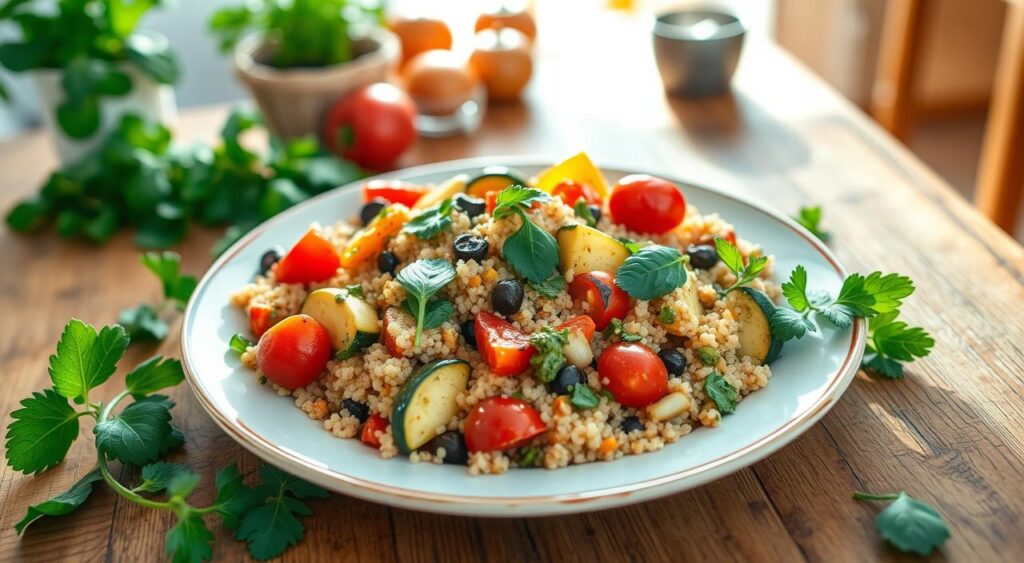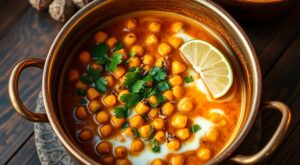Are you looking for a way to transform your eating habits while maintaining nutritional balance and flavor satisfaction? Many vegetarians struggle to find recipes that balance being low in carbs with adequate protein. Discover how incorporating healthy, plant-forward meals into your diet can enhance your overall well-being.
You can enjoy a variety of delicious and nutritious meals that support your health goals. By exploring low carb vegetarian options, you can feel more energetic and manage your weight effectively. This guide will walk you through everything from breakfast to dinner options that are both satisfying and nutritionally complete.
Key Takeaways
- Discover how to balance low carb and high protein in your vegetarian diet.
- Explore a variety of healthy and delicious meal options.
- Learn how to maintain nutritional balance while reducing carb intake.
- Understand the benefits of low carb vegetarian eating for weight management and overall health.
- Find out how to adapt these recipes to fit various dietary preferences.
The Balanced Approach to Low Carb Vegetarian Eating
Adopting a low carb vegetarian diet requires a thoughtful approach to balance your nutritional needs. Traditional vegetarian diets often rely heavily on carbohydrate-rich foods like grains, legumes, and starchy vegetables. Understanding the difference between complex carbohydrates and simple sugars is essential for creating a balanced low carb vegetarian approach.
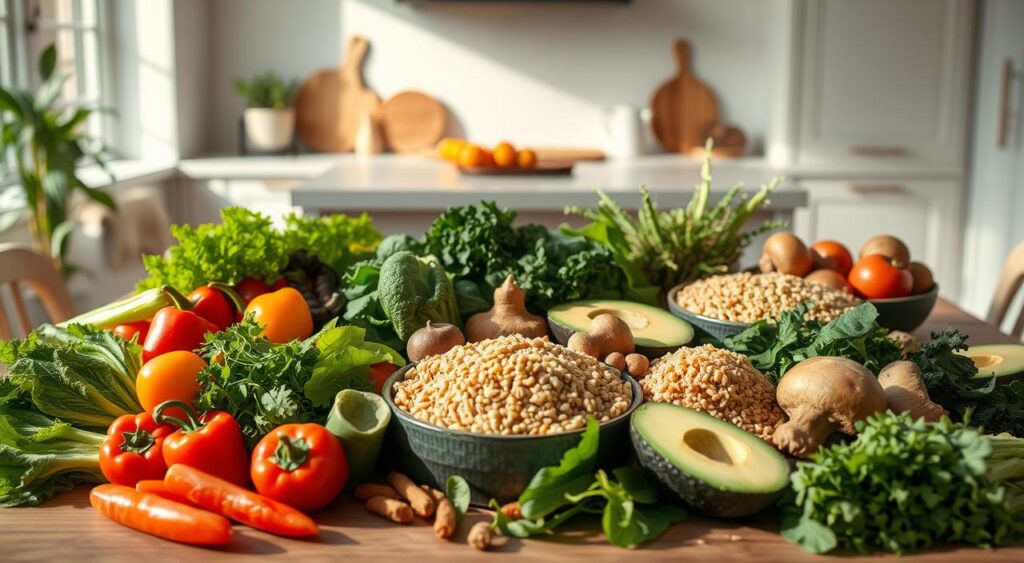
To achieve this balance, it’s crucial to explore the fundamental differences between simple and complex carbohydrates and how they affect your body differently. You should also learn why traditional vegetarian diets tend to be higher in carbohydrates and how to shift toward a more balanced macronutrient profile.
Understanding Carbohydrates in a Vegetarian Diet
Complex carbohydrates, found in whole grains and vegetables, provide sustained energy, while simple sugars cause a rapid spike in blood sugar levels. Identifying hidden carbohydrates in common vegetarian staples is vital to maintaining a low carb diet. You can achieve this by reading labels and choosing low carb alternatives.
Finding the Right Balance for Your Body
Calculating your personal carbohydrate needs based on your activity level, metabolism, and health goals is essential. Listening to your body’s signals can help you determine the ideal carbohydrate intake for your energy needs and health goals. Factors like age, activity level, and health conditions may affect your optimal carbohydrate intake as a vegetarian.
Health Benefits of Low Carb Vegetarian Recipes
Low carb vegetarian eating offers numerous health benefits, from weight management to improved energy levels. By reducing carbohydrate intake and focusing on plant-based foods, you can stabilize your blood sugar levels and enjoy more consistent energy throughout the day.
Managing Weight and Boosting Energy
You can achieve better weight management and increased energy levels by adopting a low carb vegetarian diet. This approach helps reduce cravings and promote satiety, making it easier to maintain a healthy weight. Many plant-based foods are rich in fiber, supporting digestive health and contributing to overall wellbeing.
Enhancing Gut Health and Digestion
A low carb vegetarian diet can significantly improve gut health and digestion. By incorporating fermented vegetables, leafy greens, and prebiotic-rich foods, you can enhance the beneficial gut bacteria that thrive on these nutrients. This leads to better nutrient absorption and overall wellness.
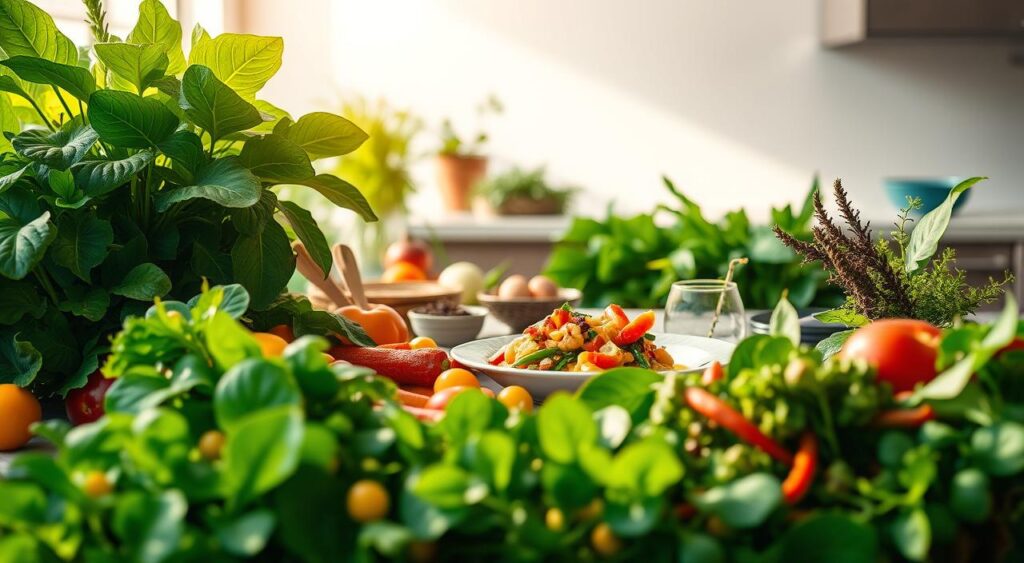
| Benefit | Description |
|---|---|
| Weight Management | Reduces cravings and promotes satiety, making it easier to maintain a healthy weight. |
| Improved Energy | Stabilizes blood sugar levels, leading to more consistent energy throughout the day. |
| Gut Health | Enhances beneficial gut bacteria through fermented vegetables, leafy greens, and prebiotic-rich foods. |
Essential Ingredients for Low Carb Vegetarian Cooking
Embracing a low carb vegetarian lifestyle begins with understanding the essential ingredients that make your meals nutritious and delicious. To cook effectively, you’ll need to focus on high-protein foods and low carb vegetables.
Protein-Rich Vegetarian Foods
Protein is crucial in a vegetarian diet. You can obtain it from sources like Paneer (21g protein per 3.5oz), Tofu (8g protein per 2oz), Eggs (6g protein per egg), Tempeh (34g protein per cup), and Cheese like Halloumi (7g protein per ounce). Incorporating these into your meals ensures you’re getting enough protein while keeping carbs low.
Low Carb Vegetables and Alternatives
Low carb vegetables are the backbone of a healthy vegetarian diet. Focus on leafy greens like spinach and kale, and cruciferous vegetables like cauliflower and zucchini. You can also use low carb alternatives like cauliflower rice and zucchini noodles to replace high-carb foods. 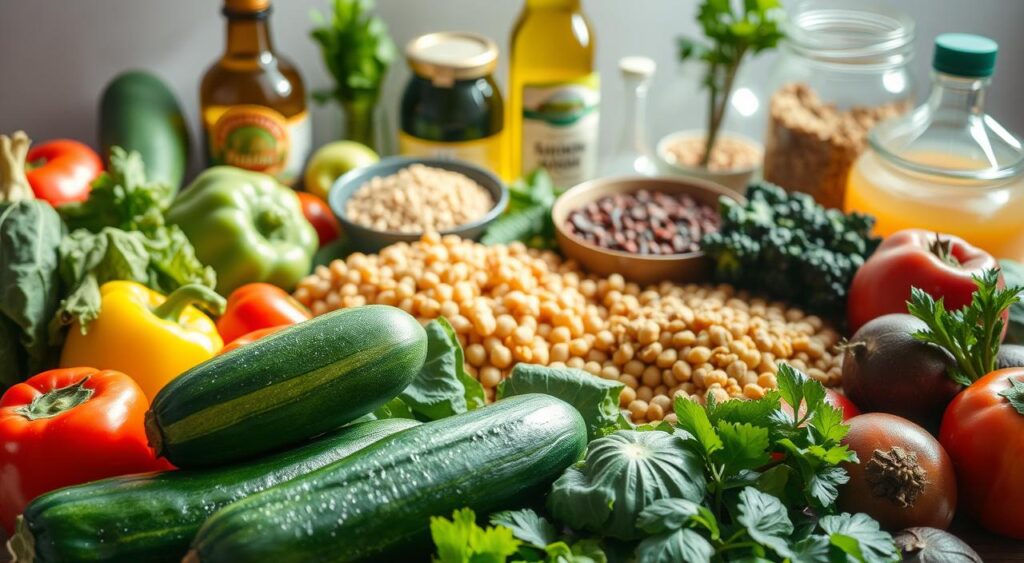 Including these in your diet will help you maintain a balanced and satisfying low carb vegetarian lifestyle.
Including these in your diet will help you maintain a balanced and satisfying low carb vegetarian lifestyle.
Delicious Low Carb Vegetarian Breakfast Ideas
You can enjoy a variety of tasty low carb vegetarian breakfast options that are perfect for a healthy morning routine. These breakfast ideas are not only delicious but also packed with nutrients to keep you energized throughout the morning.
Egg-Based Morning Meals
Egg-based breakfasts are a staple for low carb vegetarians. You can transform traditional egg dishes into masterpieces by adding vegetables and healthy fats. For instance, making a frittata with spinach, mushrooms, and bell peppers is a great way to start your day. Healthy omelettes can be on the table in just 10 minutes, making them an ideal breakfast choice for busy mornings.
Protein-Packed Smoothies and Bowls
For a quick and nutritious breakfast, consider protein-packed smoothies made with plant-based protein powders, nut butters, and low-sugar berries. You can also build a balanced breakfast bowl using low carb bases like chia seeds or yogurt. Adding healthy fats like nuts or seeds enhances satiety and provides sustained energy. Experiment with different combinations to find your favorite.
| Breakfast Idea | Protein Content | Carb Count |
|---|---|---|
| Egg Frittata | 18g | 5g |
| Protein Smoothie | 20g | 8g |
| Chia Seed Bowl | 5g | 4g |

Satisfying Low Carb Vegetarian Lunch Recipes
Low carb vegetarian lunches can be incredibly satisfying with the right combination of protein, healthy fats, and vegetables. You can create a meal that’s both nourishing and delicious by incorporating ingredients like halloumi, feta, eggs, and tofu into your salads or using low carb vegetables as the base for your meal.
Hearty Salads with Protein
Transform your salads into filling meals by adding protein-rich ingredients. A Mediterranean-inspired salad with crunchy chickpeas, creamy avocado, and crisp greens, topped with a whole block of feta, makes for a satisfying lunch option. Consider balancing your dressing with healthy fats to add flavor without extra carbs.
Warm Lunch Options Under 15g Carbs
Explore warm lunch ideas that can be prepared in under 15 minutes and contain fewer than 15g of carbohydrates per serving. Using cauliflower, zucchini, and other low carb vegetables as the base, you can create satisfying meals. Incorporating healthy fats from sources like avocado and olive oil can increase satiety.
| Low Carb Ingredient | Protein Source | Healthy Fat |
|---|---|---|
| Cauliflower | Tofu | Avocado |
| Zucchini | Feta | Olive Oil |
| Broccoli | Eggs | Nuts |
Flavorful Low Carb Vegetarian Dinner Recipes
Elevate your dinner game with these flavorful low-carb vegetarian recipes that are both healthy and satisfying. You can transform simple ingredients into a culinary delight with a few creative twists.
Cauliflower-Based Main Dishes
Cauliflower is a versatile ingredient that can be used to create delicious low-carb main dishes. You can pulse it in a food processor to make cauliflower “rice,” a low-GI side dish ready in just 10 minutes. Try roasting cauliflower stuffed with kale and chestnuts for a festive and filling meal.
Protein-Centered Evening Meals
For a satisfying dinner, focus on protein-centered meals using ingredients like paneer, halloumi, tofu, or eggs. These protein-rich foods can be incorporated into various dishes, ensuring you stay full without consuming high carbs.
| Dish | Main Ingredient | Carb Count |
|---|---|---|
| Cauliflower Rice Bowl | Cauliflower | 5g |
| Paneer Tikka | Paneer | 8g |
| Egg Frittata | Eggs | 4g |
Quick and Easy Low Carb Vegetarian Recipes
You can enjoy delicious low carb vegetarian meals without spending hours in the kitchen. With a few simple techniques and the right ingredients, you can create satisfying dishes in no time. Whether you’re a busy professional or a parent on-the-go, these recipes are perfect for you.
20-Minute Meal Ideas
Preparing a healthy meal in just 20 minutes is a reality with these quick and easy recipes. For instance, you can make a delicious, spicy vegetarian curry in less than half an hour. A simple, low-calorie spring main that uses the season’s finest ingredients can be ready in just 20 minutes. Time-saving techniques and shortcuts are key to making nutritious low carb vegetarian meals in 20 minutes or less.
One-Pan Wonders
One-pan recipes are a great way to minimize cleanup while delivering maximum flavor. From sheet pan roasted vegetables with halloumi to skillet frittatas, these dishes are perfect for a quick and easy midweek supper. Using a can of mixed beans, you can make a tomato-based veggie stew with halloumi in just 25 minutes.
| Recipe | Prep Time | Carb Count |
|---|---|---|
| Spicy Vegetarian Curry | 20 minutes | 10g |
| Sheet Pan Roasted Vegetables with Halloumi | 15 minutes | 5g |
| Tomato-Based Veggie Stew with Halloumi | 25 minutes | 8g |
By incorporating strategic meal planning and prep into your routine, you can make weeknight cooking faster and more efficient while maintaining low carb vegetarian principles. This approach allows you to build a repertoire of quick go-to meals that you can prepare even on your busiest days, avoiding high-carb convenience foods.
High Protein Low Carb Vegetarian Recipes
Boost your protein intake with these delicious high protein, low carb vegetarian recipes. You can achieve your dietary goals without sacrificing flavor or nutrition.
Tofu and Tempeh Creations
Tofu and tempeh are excellent sources of protein in a vegetarian diet. With 8g of protein and 3.5g of carbohydrates per 2-ounce serving, tofu is versatile and can be used in a variety of dishes. Tempeh offers 34g of protein per cup, making it an ideal choice for high protein meals. Learn how to prepare these ingredients to maximize flavor and texture.
Cheese and Egg Combinations
Combining cheese and eggs creates a complete protein that is not only delicious but also low in carbs. Eggs contain 6g of protein and 0.6g of carbohydrates per egg, while cheeses like halloumi and paneer offer 7g and 21g of protein per serving, respectively, with minimal carbs. Discover how to create satisfying meals with these ingredients.
Mediterranean-Inspired Low Carb Vegetarian Dishes
You can easily adopt a low carb vegetarian lifestyle by embracing Mediterranean-inspired dishes that highlight fresh vegetables and protein-rich ingredients. The Mediterranean diet is known for its balanced approach, emphasizing vegetables, healthy fats, and cheeses.
Protein-Rich Cheese Options
Halloumi and Feta-Based Recipes are perfect for a low carb vegetarian diet. Halloumi provides 7g of protein and 0g carbohydrates per one-ounce serving, making it an excellent choice. You can use halloumi to make a quick tomato-based veggie stew in just 25 minutes.
Olive and Avocado Delights
Olive and Avocado are staples in Mediterranean cuisine, contributing healthy fats and distinctive flavors while keeping carbohydrate content minimal. A mix of ripe avocado, fresh tomatoes, and basil creates an elevated caprese salad. You can explore various avocado-based recipes for innovative Mediterranean-inspired preparations.
| Ingredient | Protein Content | Carb Content |
|---|---|---|
| Halloumi (1 oz) | 7g | 0g |
| Feta (1 oz) | 4g | 1g |
| Avocado (1 medium) | 3g | 6g |
Indian-Inspired Low Carb Vegetarian Curries
The diverse and vibrant world of Indian cuisine offers numerous low-carb vegetarian curry options that are both satisfying and healthy. You can indulge in a variety of dishes that are not only flavorful but also rich in nutrients.
Paneer Tikka and Kebabs
Paneer tikka kebabs are a delightful and protein-rich option, made by marinating paneer in a mix of spices like garam masala, cumin, and chili powder, then grilling them to perfection. These kebabs are not only delicious but also low in carbs and high in protein.
Vegetable Curry Variations
You can explore a range of vegetable curry variations using low-carb vegetables and creative sauce bases. For instance, layering slices of aubergine with a spicy coconut milk and tomato sauce creates a hearty meal. Additionally, using cauliflower as a base for curries or as a substitute for rice is a great low-carb alternative.
- Discover the versatility of paneer as a low-carb protein source.
- Learn how to create flavorful curry bases using coconut milk and spices.
- Explore the use of cauliflower in Indian-inspired low-carb curries.
Seasonal Low Carb Vegetarian Cooking
Seasonal low carb vegetarian cooking is about celebrating the freshest produce of each time of year. By incorporating seasonal ingredients, you can create dishes that are not only delicious but also nutritious.
Spring and Summer Favorites
In the spring and summer, focus on low carb vegetables like asparagus, zucchini, and bell peppers. Make the most of new season’s asparagus and radishes in a vibrant salad with a French-style dressing. You can also enjoy refreshing smoothies packed with spinach and other leafy greens.
Fall and Winter Comfort Foods
As fall and winter arrive, shift your focus to hearty, warming dishes centered around cauliflower, Brussels sprouts, and various types of squash. Try cooking a big batch of spiced lentil and squash soup and freezing the leftovers for a speedy supper another day. Roasted honeynut squash stuffed with crunchy pecans and earthy rosemary makes for a stunning seasonal dish.
| Season | Low Carb Vegetarian Options |
|---|---|
| Spring | Asparagus, radishes, leafy greens |
| Summer | Zucchini, bell peppers, spinach |
| Fall | Cauliflower, Brussels sprouts, squash |
| Winter | Cauliflower, winter squash, root vegetables |
Conclusion: Making Low Carb Vegetarian Eating a Lifestyle
Adopting a low carb vegetarian lifestyle is about embracing a healthier way of living. To make this transition smoothly, focus on finding your personal carbohydrate threshold that supports your energy needs. Ensure you’re getting adequate protein and nutrients by incorporating a variety of low carb vegetarian recipes into your daily meals. This balanced approach will help you maintain optimal health and wellbeing.
FAQ
What are some high protein ingredients I can use in my low carb vegetarian meals?
You can use ingredients like tofu, tempeh, eggs, cheese, and nuts to boost the protein content of your meals. Chickpeas and paneer are also great options.
How can I make a salad more filling and satisfying?
Adding protein-rich ingredients like grilled tofu or eggs, and healthy fats like avocado and nuts, can make your salad more filling. You can also add cauliflower or mushrooms for extra fiber and texture.
What are some quick and easy meal ideas that are low in carbs?
You can whip up a cauliflower fried rice or a zucchini noodle stir-fry in no time. Other options include egg-based dishes, salads with protein, and one-pan wonders with vegetables and cheese.
Can I use coconut milk and coconut oil in my low carb vegetarian recipes?
Yes, coconut milk and coconut oil are great additions to low carb vegetarian recipes. They add healthy fats and can enhance the flavor of your dishes.
How can I ensure I’m getting enough nutrients on a low carb vegetarian diet?
Focus on eating a variety of vegetables, including leafy greens like spinach, and protein-rich foods. You can also consider consulting with a registered dietitian or a healthcare professional for personalized guidance.
Are squash and tomatoes suitable for a low carb vegetarian diet?
While squash and tomatoes are nutritious, they do contain some carbohydrates. However, they can be part of a low carb vegetarian diet in moderation. Be mindful of portion sizes and balance them with other low carb foods.
